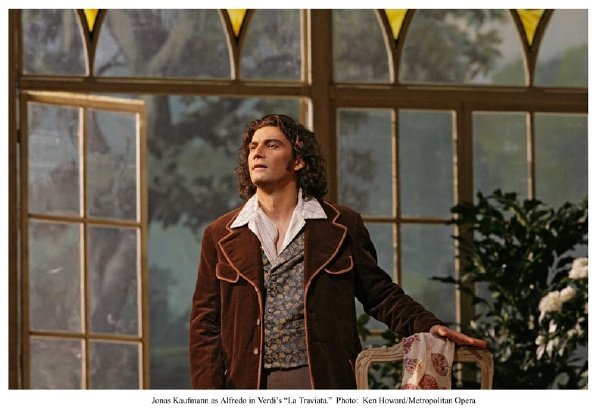|
|
|
|
|
|
|
|
| By RONALD BLUM, Associated
Press Writer, Sunday, February 5, 2006 |
|
Verdi: La Traviata, Metropolitan Opera House, February 2006
|
Gheorghiu Triumphs in 'Traviata'
|
|
 Angela Gheorghiu sang the first note of "Sempre
libera" and off she went, like a sprinter spurting ahead of the field,
leaving conductor Marco Armiliato and the orchestra to chase. Angela Gheorghiu sang the first note of "Sempre
libera" and off she went, like a sprinter spurting ahead of the field,
leaving conductor Marco Armiliato and the orchestra to chase.
More than seven years after she was to appear in the premiere of a
Metropolitan Opera production planned around her Violetta, Gheorghiu finally
appeared in the Franco Zeffirelli staging of Verdi's "La Traviata" on
Saturday night and scored her biggest triumph yet at the Met.
At times the opera seemed to become Gheorghiu vs. Armiliato, and the soprano
won out in the quest for her preferred pacing. In Act II, there was hardly
the specified pause before her "Dite alla giovine" solo as Armiliato went
along. But even with the tempi tussle, Gheorghiu gave a captivating
performance that left some wet eyes in the audience as Violetta collapsed
and died at the final curtain.
Gheorghiu combined with the ebullient Alfredo of tenor Jonas Kaufmann, who
was making his Met debut, and the grave Germont of Anthony Michaels-Moore to
make it a night of Verdi the way it used to be, one that had the crowd
applauding and yelling approval from start to finish.
Gheorghiu, a 40-year-old Romanian soprano, made her international
breakthrough as Violetta at Covent Garden in 1994 under the baton of Sir
Georg Solti. With her long, black hair and sexy appearance, she is a moving
actress and singer, vividly bringing to life and then portraying the death
of the courtesan who succumbs to consumption.
Met general manager Joseph Volpe originally had wanted Gheorghiu and Roberto
Alagna, her husband, to sing the production premiere in November 1998. But
seven months before the opening, he announced they hadn't signed their
contracts, which has been issued two years earlier, and were being replaced.
Volpe left the impression they didn't like Zeffirelli's opulent (some say
unnecessarily so) designs. The couple's then-spokesman called it a
scheduling conflict, and Gheorghiu later attributed it to a
misunderstanding.
Zeffirelli's busy sets were received with applause by the audience, which
also cheered the final-act scene change the director created by having the
stage elevator shift the action from Violetta's bedroom back to the house's
first floor.
Some tweaks in the staging improved matters, with Gheorghiu's Violetta a bit
more hyperkinetic than those at the Met in recent memory, dancing around the
stage in the opening scene. She also showed off striking new gowns conceived
for this revival by Raimonda Gaetani, the original costume designer. In Act
I Gheorghiu wore a corset and petticoat, topped by a long silk-looking red
jacket with blue lining that she throws off (with a little difficulty) for
"Sempre libera." She had a huge straw hat for the opening of Act II, and for
the ball scene at Flora's, she wore a shimmering white gown and headdress.
With three superior actors on stage, Zeffirelli elaborate sets didn't seem
to swallow up the singers so much. The silly dancing ballerinas in cow suits
during the matador scene at the ball in past seasons were jettisoned in
favor of the slightly less silly prancing men wearing bull heads.
Kaufmann displayed dashing looks and a big shiny voice that bodes well
for his future. Program notes say he already is scheduled to sing heavier
roles such as Parsifal, which does not. He was said to be singing with a
cold, which might explain the tentativeness he showed early on as he tried
to find the right volume.
Michaels-Moore gave a strong performance as a dignified and elegant Germont,
who convinces Violetta to give up his son so the family honor can be
restored and his daughter's engagement not interfered with. His voice keeps
improving, and he matched it to the acting needed in this conflicted
character.
Members of the audience coughed repeatedly as Violetta was on her deathbed
during the quieter moments in the final act, making it unclear whether the
greater illness was on stage or in the seats.
|
|
|
|
|
|
|
|
|
|
|
|
|
|
|
|
|
|
|